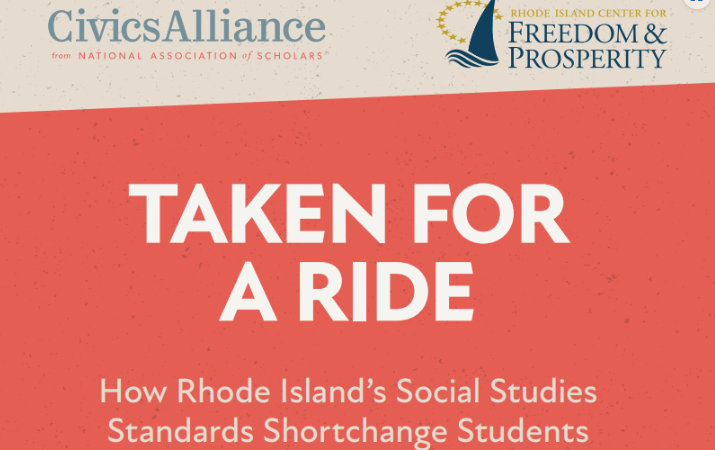Mini-Victory: Based on the Center’s Report, RIDE Corrects Some Errors, but Maintains Core Politicization and Unprofessionalism
by David Randall, author of “Taken for a RIDE”
The Rhode Island Department of Education (RIDE) has just issued its final draft of the Rhode Island Social Studies Standards. RIDE made cosmetic changes in response to the critiques of Taken for a RIDE: How Rhode Island’s Social Studies Shortchange Students (Civics Alliance and Rhode Island Center for Freedom & Prosperity). It retains the core of its politicization and its historical errors.
RIDE has responded to several of the critiques in Taken for a RIDE.
- The new Standards have restored the Persian and Macedonian Empires to the proper millennium and the proper continent.
- They no longer date the Bolshevik Revolution before World War One.
- They explicitly acknowledge that the Caliph must be male (p. 321).
- They have reduced the number of times they use the cynical phrase and who benefitted from 149 to 31.
- Perhaps most importantly they have simply excised the sixth-grade sequence on modern American history, which was used as a prompt for extraordinarily intensive radical identity politics propaganda and action civics instruction, and replaced it with expanded World History instruction. Some of the radical material from the sixth grade has been inserted into eighth grade (p. 188), but much compressed.
Rhode Island’s parents can be grateful that RIDE accepted at least some of the critiques in Taken for a RIDE.
RIDE, unfortunately, has preserved its confusing format, its repetitive and misguided “inquiry” questions, the large majority of its politicized material, and even some of the historical errors. RIDE preserved unchanged its grotesquely politicized Anchor Standards, such as “Students act as economists as they… Argue how different economic systems can create more equitable outcomes for individuals and communities, particularly for those traditionally marginalized from the economic system.”
RIDE preserves mention of “same sex caregivers” in Kindergarten (p. 15)—and has, incidentally, now excised the word “parent” from the standards, along with “mother” and “father.” RIDE.
RIDE still asks “What is the United States’ own history of genocide?”, and has now added the defamatory polemic of “cultural genocides” to its discussion of the topic (p. 222).
RIDE still incorporates radical jargon such as “positionality” (p. 232) and “sexual identity” (p. 203). RIDE still tells the myth of Iroquois (“Haudenosaunee”) influence on the Constitution and the Declaration of Independence (pp. 121, 170-71, 200, 236).
RIDE still teaches outright historical errors: it refers to the Mesopotamian empire (p. 303) and the Islamic empire (pp. 319-21), and it still (despite trivial changes in wording) confuses Manifest Destiny and the Monroe Doctrine (p. 355).
RIDE still refuses to mention foundational topics of the histories of religion and liberty such as Jesus of Nazareth, the Bible, Greek liberty, Parliament, or common law.
Rhode Island’s citizens still suffer from RIDE’s persistent politicization and historical error, which have produced systematically politicized Standards that are unworthy of a free republic or professional educators.
RIDE, moreover, has added new material that confirms the systematic subordination of its Standards to radical politics:
Diverse Identities: The Rhode Island Social Studies Standards are intended to 1) validate and affirm individuals’ diverse and intersectional identities, where the term intersectional refers to the interconnected nature of social categorizations such as race, class, gender, ability, religion, etc. as they apply to a given individual or group, and regarded as creating overlapping and interdependent systems of discrimination or disadvantage, 2) elevate the voices and perspectives of traditionally excluded groups while ensuring the funds of knowledge and cultural capital of students, families, and their communities are central to the learning process and 3) avoid minimizing or ignoring unpleasant realities (e.g., oppression, prejudice, racism, sexism, etc.). (pp. 5-6)
Critical Consciousness: The Rhode Island Social Studies Standards are intended to 1) help students make sense of and critique the world around them, naming and acting upon the “norms, values, mores, and institutions that produce and maintain inequities.” 2) help build students’ abilities as citizens to recognize and move to act against bias, stereotypes, and inequities in their immediate environment, their communities, and the world around them. (p. 6)
RIDE’s new material also confirms how national initiatives such as Educating for American Democracy damage social studies education throughout the nation, by providing specious justifications for eliminating actual civics education.
Throughout this document, the term ‘citizen’ is not used in a strict legal sense. When used in this document, it typically refers to anyone who is an active and responsible participant in society. This civic-focused use of the word is not intended to discount the narrower use to individuals with full rights under a particular system of government. See page 26 of Educating for American Democracy: Excellence in History and Civics for All Learners report (2021) for more information about the dual meanings of “citizen” and ‘citizenship.’ (p. 6, note 9)
RIDE has betrayed Rhode Island’s citizens and lawmakers. When Rhode Island’s lawmakers delegated to RIDE the unreviewable power to create social studies standards, they did so with the presumption that RIDE would act with minimum professional standards, both to provide depoliticized instruction and to avoid simple historical error. RIDE has not done so—and when challenged on its unprofessional, politicized work-product, has doubled down on its politicization and its unprofessional standards.
Rhode Island’s citizens and lawmakers can and should hold RIDE’s leadership accountable for its dereliction of duty.



